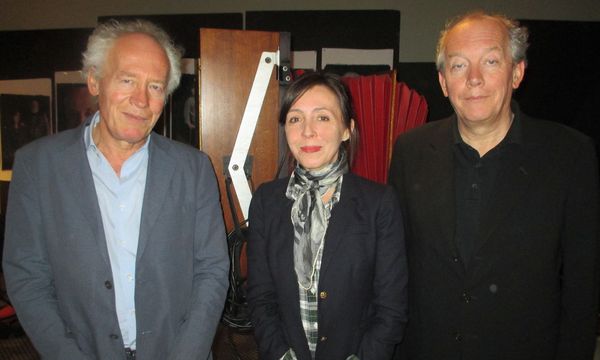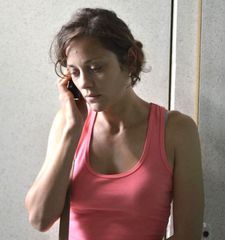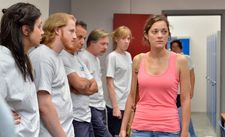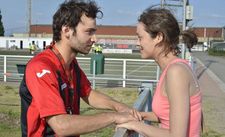 |
| Jean-Pierre Dardenne and Luc Dardenne directors of Two Days, One Night with Anne-Katrin Titze: "We spent a long time with the costumes." Photo: Ryan Werner |
Jean-Pierre Dardenne and Luc Dardenne's latest masterpiece of conscience, Two Days, One Night (Deux Jours, Une Nuit), stars Marion Cotillard with Fabrizio Rongione, Catherine Salée, Batiste Sornin, a formidable Olivier Gourmet, Timur Magomedgadzhiev and Catherine Salée, who played the mother of Adèle in Abdellatif Kechiche's Blue Is The Warmest Colour.
The Dardennes and I spoke about fairy tales, their work with costume designer Maïra Ramedhan Levi, finding the right clothes, the use of rehearsals, suspense, seduction versus vulnerability and working with stars.
 |
| Marion Cotillard as Sandra: "The pink top she wears, tells a number of things." |
After having suffered a nervous breakdown Sandra (Marion Cotillard), a worker in a Belgian solar panel factory, finds out that in her absence, her 16 co-workers were asked by management to vote on if they preferred to have her return or to take a €1,000 bonus for themselves.
She has the weekend, the time frame of the title, to convince her colleagues to let her keep her job. Her husband Manu (Fabrizio Rongione) works in the kitchen of a highway pit stop restaurant, they have two children, and the loss of her job would be a financial disaster. The situation clearly already is a catastrophe for her state of mind and sense of self.
Anne-Katrin Titze: We spoke about fairy tales when you were presenting The Kid With A Bike at the 2011 New York Film Festival. You [to Jean-Pierre] told me your favorite tale was Little Red Riding Hood and that your brother's was Cinderella. All your films for me resemble in one way or another classic tales, such as those of the Grimms.
Luc Dardenne: This one too? A fairy tale?
AKT: Yes, Two Days, One Night as well. It has the journey of an individual character who has to overcome enormous obstacles, move mountains and struggle with giants in order to find themselves and truly bond with another.
Luc: Which tale?
AKT: In this case, I wasn't reminded of any tale in particular. Not like L'Enfant, which shares the initial situation with Rapunzel - parents selling their baby. Here it is the folktale tradition - a very real traumatic situation that sends the hero on her journey.
 |
| Marion Cotillard as Sandra at work: "She is looking for solidarity." |
Luc: We never thought of fairy tales in this context. We started out with the premise of a woman who was still somewhat trapped by her illness and her fears. She was going to move from place to place to place and gradually this will transform her. That was the basis for the structure to bring her out of that place of fear and feeling locked in.
AKT: Water is key in your film. Beyond the realism, she seems to be drowning and dying of thirst simultaneously.
Sandra battles her anxiety attacks and hyperventilation on the road with seemingly endless bottles of water.
Jean-Pierre Dardenne: When we think of water, first and foremost we think about how it's used pragmatically. We never think of how we can use water to symbolise this and this. The symbolism is a bonus, if it shows up.
AKT: That is absolutely how I saw it, as surplus, but an important surplus.
Jean-Pierre: The water is there when she took the pills etc.
AKT: Most striking for me was how you show the effort it takes for her to overcome the obstacles. One way or another, I think we all know the feeling. Do not disturb is an unwritten injunction in this world we live in today. Sandra in your film has to overcome her fear 14 times. Was it clear to you that it had to be such a high number?
 |
| Sandra with Batiste Sornin as Dumont and Catherine Salée as Juliette: "…it's the lack of value Sandra has for M. Dumont." |
While she tries to control anxiety attacks with Xanax, Manu does his best to support his wife so that she can face her fears and confront the 14 hostile entities.
Luc: That is the question. In the beginning we were worried that this repetition would become boring. Actually as we started working with it, we realised that, no, in fact, this was the dramatic springboard for the movie that would keep it going. Then we realised, what really was the link for the suspense has to come from this question. Who was she going to see each time?
There is a moment of suspense every time before a new face appears. Is it a man or a woman? Will they say yes or no? Depending on their answer, it will bring us closer to victory or defeat. And the fourth thing is, how will she react to it. Will she fall back into another depression or not? If they say yes, is she going to go in the direction of euphoria?
AKT: You speak of suspense - the moment right before she meets them is the worst. This is the point of the greatest audience identification. You show the doorbells which loom like an almost insurmountable obstacle. When she calls the soccer coach from the field, the shame we see is so real. Any of the people she encounters deserves a film of their own.
Jean-Pierre: The next films, maybe. We'd have the next nine films ready.
AKT: Tell me about the clothes you chose for Marion Cotillard to wear as Sandra. The tank tops make her look both vulnerable and strong. In the last shot, I thought, there goes Gary Cooper in High Noon.
 |
| Fabrizio Rongione (Manu) Marion Cotillard (Sandra): "She needs to feel that there is an identification with the others." |
Jean-Pierre: We spent a long time with the costumes. Our costume designer [Maïra Ramedhan Levi] was on location from the very start, from the beginning of the rehearsal process, a month and a half before the shoot starts. In terms of how important the actor's part is - and Marion is in every frame, so she was there all the time, we look at the costumes and work with the costumes and explore the costumes after the rehearsals, during the rehearsals, all the time, constantly. It's a very lengthy process. We spent a lot of time with the costumes.
Luc: And we changed them. We may find the costume that we feel worked and since we film all the rehearsals, we look at the rushes and we'll see and we say it's pretty good, or it's good, or not quite. Sometimes when we look at the costumes, the actors also make suggestions. But you have to be very wary because it's not always on target. They might pick something that feels good for them as an actor but is not right in terms of the character, not Marion, though.
AKT: Can you talk about the specific choices in this case?
Jean-Pierre: It has to be everyday clothes that people would wear in real life. At the same time, it has to tell you more. With a character like Sandra who doesn't have a lot of money, it's limited in terms of what she can wear or not wear. The simpler the character's needs in terms of clothing, the longer it takes to find the right item. The pink top she wears, tells a number of things.
The fact that she wears that top is very important for what she is expressing to the people that she goes to see. She is saying to them, hey, I'm back in shape, active, alive. She is not wearing something that underscores the depressive element in her personality.
 |
| Fabrizio Rongione (Manu) Marion Cotillard (Sandra): "Her value is not only through being recognized by her family or by her children." |
AKT: She can't afford to hide her body.
Jean-Pierre: The fact that you have a lot of light that is on her body, that gives her an almost boxer kind of quality but it also really opens her up. It makes her very vulnerable.
Luc: You know, it's tricky. On the one hand by having so much exposed, it makes her very vulnerable. On the other hand she couldn't be dressed in a way that was seductive. That wouldn't have worked either. It had to be that fine line between something that exposed her but did not make her seductive.
AKT: That goes into the direction of the never explicitly touched upon theme that might come to mind when she tells the wives she has to talk to their husbands. Incidentally, Julianne Moore in David Cronenberg's Maps To The Stars wears a similar combination of a tank top with different color straps showing. The characters share some of the vulnerability, although they live in such different worlds. The protagonist in your film says at one point that she feels as though she doesn't exist. Would you say this is an issue now, more than maybe in some time in the past?
Luc: Yes. I think she represents something that is much more generalised today. People being kept aside is more common as the economy is very very tough. Her value is not only through being recognised by her family or by her children. It has to happen also socially on the outside and through her work, which is maybe a little bit different than it used to be.
It's always been like that with men. She now needs the recognition from the outside and that is clearly seen when she gets a refusal or an acceptance. When she gets a "no", she loses her voice or she doesn't feel well. When she gets a "yes" she feels validated.
 |
| Timur Magomedgadzhiev with Marion Cotillard as Sandra - when she calls the soccer coach from the field, the shame we see is so real. |
AKT: The relationship between survival and dignity is important in your film. Work always also has to do with dignity, it is not only survival.
Cotillard tenderly lets us in on every nuance of dread, every vital decision.
Luc: It is not survival at any cost. Survival does not take precedence over the other factors, which is really looking for solidarity. She needs to feel that there is an identification with the others. She is looking for their agreement, for their acceptance. If she were looking only for survival it would be something more like Rosetta [the protagonist in their 1999 film], who is willing to kill, is willing to steal, is willing to do anything to get to her goal. And she would have taken the place of the worker at the end when she was offered the opportunity. And Sandra doesn't. She is looking for something else. She is looking for solidarity.
AKT: In your last two films, you were working with well-known stars. Marion Cotillard in this one and Cecile de France in The Kid With A Bike. Is the working process different?
Jean-Pierre: Yes and no. There are two things. What's interesting to us is to see how we can throw her into a familiar cauldron, so to speak, and how that's going to enrich the mix. The other thing, of course, is that she is a great actress and we can ask her things which are very fine-tuned which she can respond to. And that's, of course, an immense pleasure - to work with that kind of refinement.
AKT: It's fascinating how Olivier Gourmet is haunting this film.
Luc: Surprise for the end.
AKT: Perfect casting for an absent actor.
Luc: Everybody speaks about him!
AKT: He is in all of your films. Did you pick him for this role right away?
Luc: We didn't really think of him right away for that part but we always like to have him in our films. We never thought of another actor for the role of Jean-Marc. It's not so easy, Olivier is very solicited in terms of making other films. We had to catch him at the right moment. He was the only actor of all of them who wasn't able to rehearse with us ahead of time.
Jean-Pierre: That's why we gave him the bad-guy role.
AKT: The boss [Batiste Sornin as Dumont] says one of the most chilling, casual lines in the context of Two Days, One Night. "I'll be free in ten minutes."
Jean-Pierre: At the same time, it's the lack of value Sandra has for M. Dumont and we were concerned that he didn't come across as a caricature.
AKT: It felt very real, exactly how a person like that would talk. Thank you.
Two Days, One Night (Deux Jours, Une Nuit) is Belgium's Oscar submission for Best Foreign Language Film at next year's Academy Awards. It opens in the US on December 24 and will be available on DVD in the UK from October 20.





















